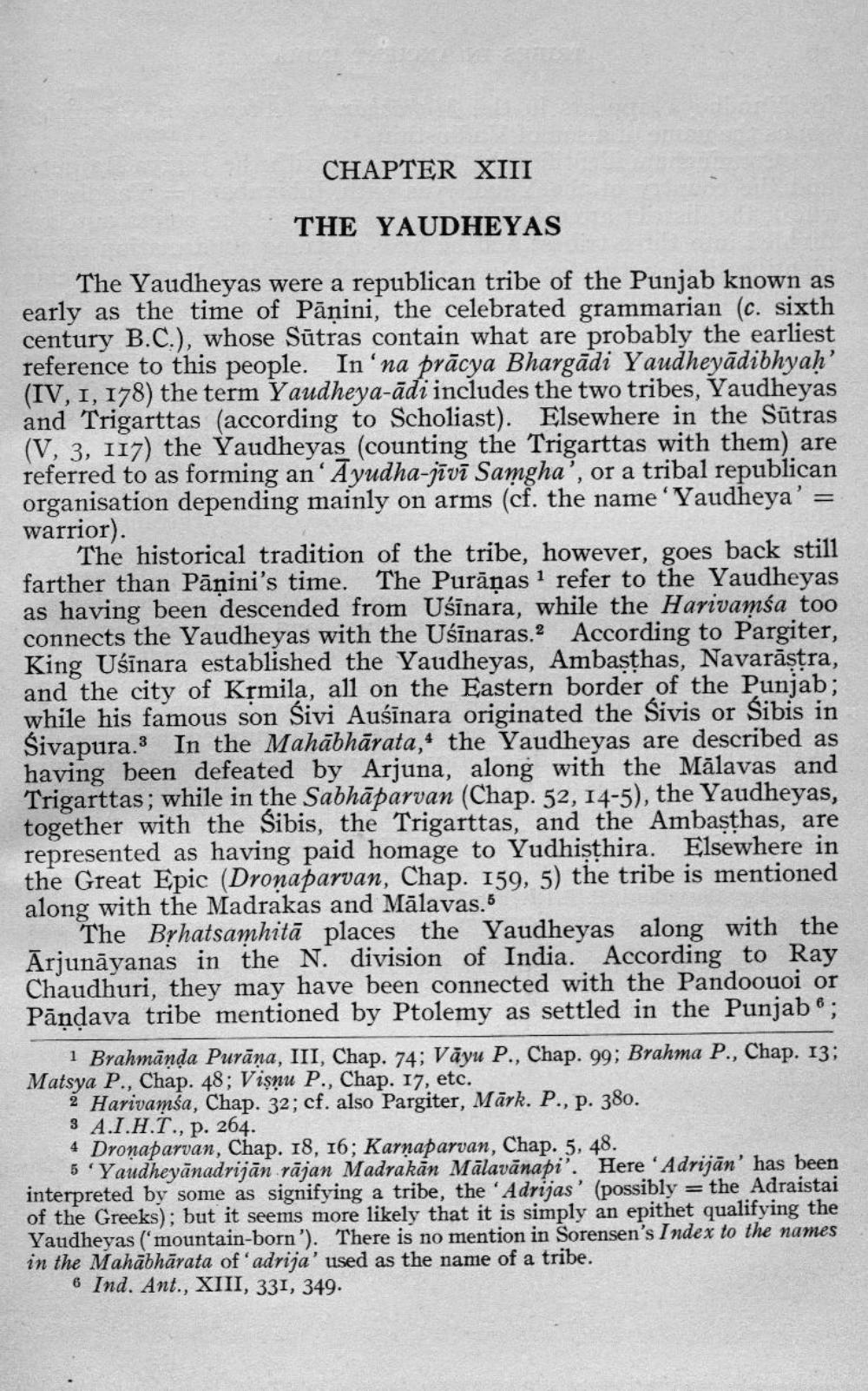________________
CHAPTER XIII
THE YAUDHEYAS
The Yaudheyas were a republican tribe of the Punjab known as early as the time of Pāṇini, the celebrated grammarian (c. sixth century B.C.), whose Sūtras contain what are probably the earliest reference to this people. In na prācya Bhargādi Yaudheyādibhyah' (IV, 1, 178) the term Yaudheya-ādi includes the two tribes, Yaudheyas and Trigarttas (according to Scholiast). Elsewhere in the Sūtras (V, 3, 117) the Yaudheyas (counting the Trigarttas with them) are referred to as forming an‘Āyudha-jīvī Samgha', or a tribal republican organisation depending mainly on arms (cf. the name Yaudheya' = warrior).
The historical tradition of the tribe, however, goes back still farther than Panini's time. The Purāṇas 1 refer to the Vaudheyas as having been descended from Uśīnara, while the Harivamśa too connects the Yaudheyas with the Uśīnaras.2 According to Pargiter, King Uśīnara established the Yaudheyas, Ambasthas, Navarăstra, and the city of Kệmila, all on the Eastern border of the Punjab; while his famous son Sivi Auśīnara originated the Sivis or Sibis in Śivapura.3 In the Mahābhārata, 4 the Vaudhevas are described as having been defeated by Arjuna, along with the Mālavas and Trigarttas; while in the Sabhāparvan (Chap. 52, 14-5), the Yaudheyas, together with the Sibis, the Trigarttas, and the Ambasthas, are represented as having paid homage to Yudhisthira. Elsewhere in the Great Epic (Dronaparvan, Chap. 159, 5) the tribe is mentioned along with the Madrakas and Mālavas. 5
The Byhatsamhitā places the Yaudheyas along with the Ārjunāyanas in the N. division of India. According to Ray Chaudhuri, they may have been connected with the Pandoouoi or Pāņdava tribe mentioned by Ptolemy as settled in the Punjab &;
1 Brahmānda Purāna, III, Chap. 74; Vāyu P., Chap. 99; Brahma P., Chap. 13; Matsya P., Chap. 48; Vişnu P., Chap. 17, etc.
2 Harivamśa, Chap. 32; cf. also Pargiter, Mārk. P., p. 380. 3 A.L.H.T., p. 264. 4 Dronaparvan, Chap. 18, 16; Karnaparvan, Chap. 5, 48.
5 ‘Yaudheyānadrijān rājan Madrakán Mālavānapi'. Here 'Adrijān' has been interpreted by some as signifying a tribe, the 'Adrijas' (possibly = the Adraistai of the Greeks); but it seems more likely that it is simply an epithet qualifying the Yaudheyas ('mountain-born'). There is no mention in Sorensen's Index to the names in the Mahābhārata of 'adrija' used as the name of a tribe.
6 Ind. Ant., XIII, 331, 349.




